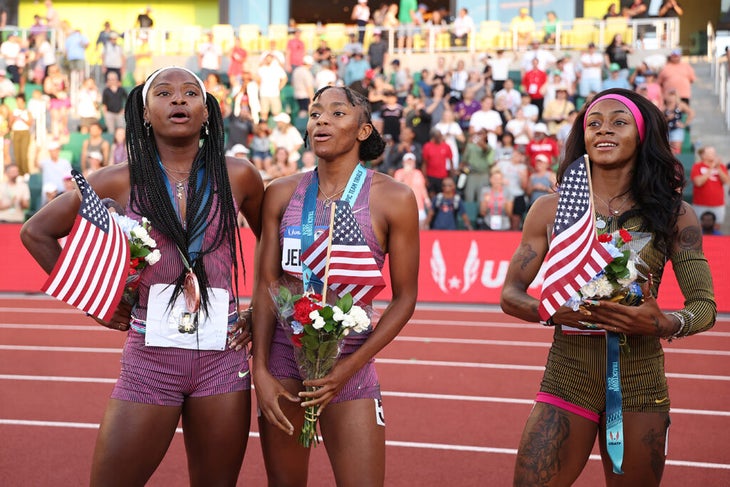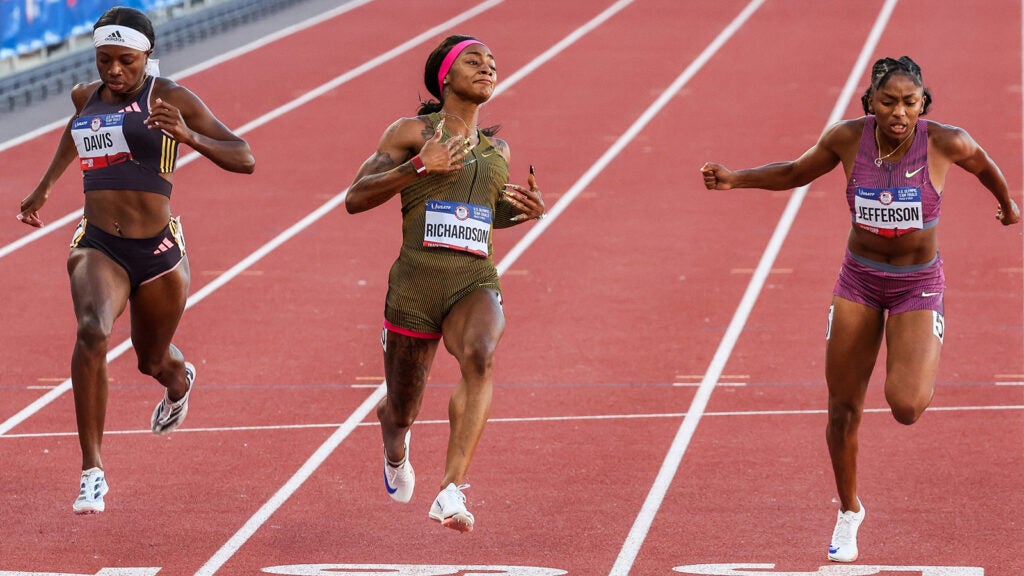“], “filter”: { “nextExceptions”: “img, blockquote, div”, “nextContainsExceptions”: “img, blockquote, a.btn, a.o-button”} }”>
New perk: Easily find new routes and hidden gems, upcoming running events, and more near you. Your weekly Local Running Newsletter has everything you need to lace up!
>”,”name”:”in-content-cta”,”type”:”link”}}”>Subscribe today.
Sha’Carri Richardson is coming of age right before our very eyes.
And with each step of her evolution—which continued with some very speedy strides on Saturday night in Eugene, Oregon—a beautiful story is unfolding.
The 24-year-old American sprinting star won the 100 meters at the U.S. Olympic Trials for the second time in three years, but this time she appears to have finally secured a chance to run for an Olympic gold medal. Despite having to overcome another poor start, Richardson used her supersonic second-half closing speed to blitz the other eight runners in the field, cruising through the finish line in 10.71 seconds—the fastest time in the world this year.
In a stunning display of physical power and mental acuity, Richardson ran three 100-meter races over two days in the opening weekend of the trials, each faster and slightly better than the previous one. She began 2024 as the reigning world champion and the Olympic favorite, and with each victory in Eugene, her prospect for Olympic gold—and her dynamic personal evolution—became sharper and more acutely focused.
RELATED: Read more Olympics track and field stories from Outside RUN
Richardson’s opening-round win on Friday evening in 10.88 seconds was impressive, but more so because of her ability to overcome a slight stumble out of the starting blocks than for her all-out speed. Her Saturday evening semifinal win in 10.86 seconds was similarly enticing and marginally more proficient after again being hampered by a slow start. But her win in the Olympic Trials final two hours later—the race she needed to officially punch her ticket to the Paris Olympics—was simply exhilarating and something to behold because of her sheer dominance and also because it was a moment three years in the making.
While she briefly celebrated with just a dash of her typical flamboyance that fans have grown to expect and love, she also soaked in the moment with a touch of humility as she briefly knelt to the track and acknowledged how hard she’s worked and all the support she has received to realize the dream that eluded her three years ago in the Covid-delayed Tokyo Olympics.
“This time around, I feel as if it was more—definitely still my confident, still my exciting, normal self, but more so the overwhelming feeling of joy,” Richardson said.
Then she celebrated with Star Athletics training partners Melissa Jefferson and Twanisha “Tee Tee” Terry—who were second (10.80 seconds) and third (10.89 seconds), respectively, a clean sweep for the trio that will represent the U.S. in the 100 meters at the Paris Olympics beginning on August 2 on the purple track at Stade de France.
“I feel that it definitely confirms the year that we’ve been training for, and preparing for this moment,” Richardson said. “It’s a full-circle moment to be grateful, appreciative of the direction we’re headed, and where we’ve come from. And I’m super excited to continue to grow and build from this momentum that we’ve already established by sweeping the Olympic trials.”
RELATED: Sha’Carri Richardson Overcomes Stumble to Win 100 Meters Prelim Race
Sha’Carri Richardson Is A Phoenix Rising
Three years ago, Richardson was eager to make her mark on the world stage and pursue her long-held Olympic dreams after dominating the collegiate ranks for Louisiana State University. In her singular season at LSU, she set a new collegiate record of 10.72 and won the NCAA 100-meter title in 2019, then turned pro and signed with Nike amid high expectations to race in the Tokyo Olympics in 2020. Then, after the Covid pandemic put everything on hold, she continued her progression with similar buildup to success the following year by winning 100 meters at the U.S. Olympic Trials in Eugene in 10.86 seconds in extravagant fashion. But that Olympic quest was short-lived and crashed and burned without a storybook ending.
Less than a week after that victory, Richardson was informed that her standard post-competition drug test came back positive for marijuana use (which is on the banned substance list of the World Anti-Doping Agency), resulting in a 30-day suspension that kept her out of the Tokyo Olympics. Richardson admitted that she relied on marijuana as a coping agent to help her get through the grief of losing her biological mother, who had passed away just a week before the trials began.
To her credit, Richardson owned the narrative, accepted the blame and resolved to come back stronger. But the disappointment of that news—both for Richardson and for millions of track and field fans in the U.S. and around the world—created a firestorm of backlash that impacted her physically and emotionally for nearly two full years.
In 2022, despite strong early season performances, Richardson failed to make the finals of the 100 meters or 200 meters at the U.S. championships, so she missed out on running in the World Athletics Championships in Eugene, the first track and field world championships ever held on American soil.

History is littered with great athletes who have made mistakes and endured disappointment and never recovered to achieve success at the highest level. But despite the challenges and critics, Richardson never lost sight of her dream and never stopped working relentlessly to achieve it. During that time, she continued to embrace the support of her family and work on herself—not only the physical acts of training and racing with coach Dennis Mitchell and her Star Athletics training partners—but to remain immersed in her pursuit of excellence with her deep-rooted faith and the personal belief that her special talents are divinely ordained.
With a continually more grounded approach, Richardson prophetically said after winning last year’s U.S. championships that she wasn’t back, she was better. She carried that wave of resurgent energy to the world championships in Budapest, Hungary, where she removed any lingering doubt that she was already the best sprinter in the world by defeating Jamaican legends Shericka Jackson and Shelly-Ann Fraser-Pryce to win her first 100-meter title in a championships-record 10.65 seconds.
Winning the gold medal at the world championships was a huge moment for Richardson, but it wasn’t the Olympics. To win the Olympic gold, she’d have to continue to continue her personal transformation, dig deep for another year, stay healthy and then get through three rounds at this year’s Olympic Trials in Eugene.
Although she wasn’t perfect in her execution, she was present, and that proved to be more important to achieving her goal. In each race, she was the last one to get out of the starting blocks, but each time she made up ground so quickly that the momentary spark of a possible failure was immediately snuffed out and quickly turned into a resounding dash through the finish line.
To do it in the final with training partners Jefferson and Terry in her wake made it extra special, in part because they’ve been a big part of her evolution and growth, too. They’ve all embraced in the shared purpose of hard work and commitment, toiling on a daily basis on the track but also offering each other much-needed constructive criticism as well as celebratory praise along the way.
Has the Star Athletics trio put the world on notice? Heck no, the rest of the world’s top sprinters have seen this coming for years.
“I definitely feel like we already have done that,” Richardson said. “We knew this moment could be possible as long as we put our minds, our body, as well as our spirit into it. And today, with every single one of us—as well as the team and the support system that we all have building up each other—we knew that this was possible and we got the job done today. So we didn’t put the world on notice. The world already knew who we were.”
While success in Paris seems imminent, it is not guaranteed for Richardson, and certainly not for Jefferson or Terry. Saint Lucia’s Julien Alfred (10.78) and Nigeria’s Rosemary Chukwuma (10.88) will be among several formidable foes in Paris, where a slow start will be exposed and much harder to overcome. And while Fraser-Pryce is heading toward retirement after this season and Jackson has yet to break 11 seconds this year, Jamaica is chock full of young, talented sprinters, including 20-year-old Brianna Lyston, who two weeks ago finished second at the NCAA Championships for LSU in 10.89 seconds.
RELATED: More News from the U.S. Track and Field Olympic
Embracing Her Gift
America loves a comeback, and especially when individuals triumph after overcoming their own mistakes. Although her 2021 setbacks will eventually be lost in the shuffle, Richardson’s resurgent quest to win Olympic gold will be brighter because of what she’s had to overcome and how she’s evolved.
It’s a rare opportunity, and not everyone who endeavors to do that sees it to fruition.
Thousands of exceptional athletes have run on the track at Hayward Field in Eugene—both in the modern world-class structure that reopened in 2021 and the original facility that preceded it for 100 years—but none have had more of a lasting impact than Steve Prefontaine, a U.S. distance running legend who held numerous American records and, like Richardson, unapologetically took on the world in his own bold and sometimes brash ways.
Prefontaine famously said, “To give anything less than your best is to sacrifice the gift.” Prefontaine came up short in his quest to win an Olympic gold medal in 1972, perhaps foolishly taking the lead too early in the final of the 5,000 meters in Munich, only two wind up a disappointing fourth. “Pre” worked hard for the next three years to earn redemption and eventually make amends at the 1976 Olympics in Montreal.
But for Pre, that never became a reality. Just hours after winning his final race at Hayward Field in May 1975, the 24-year-old track star died in a car accident only a mile and a half away from the track.
The Sha’Carri Express is speeding to Paris now, but if the past three years have taught her anything, it’s that she has a gift that she needs to protect and nurture—by trusting her faith and taking care of her body, her mind, and her spirit with humility—if she wants her Olympic dreams to come true.
“For the past three years, I’ve grown with a better understanding of myself, a deeper respect and appreciation for my gift that I have in the sport and as well as my responsibility to the people that believe and support me,” Richardson said. “I felt like all of those components have helped me grow and will continue to help me grow into the young lady that I have been divined by God to become and I’ve been blessed to be, and I am grateful because of it.”
RELATED: Your Guide to the U.S. Track and Field Olympic Trials
